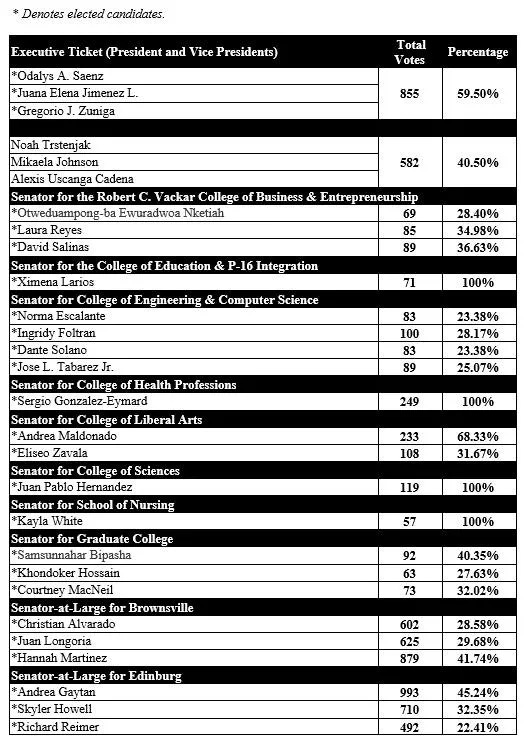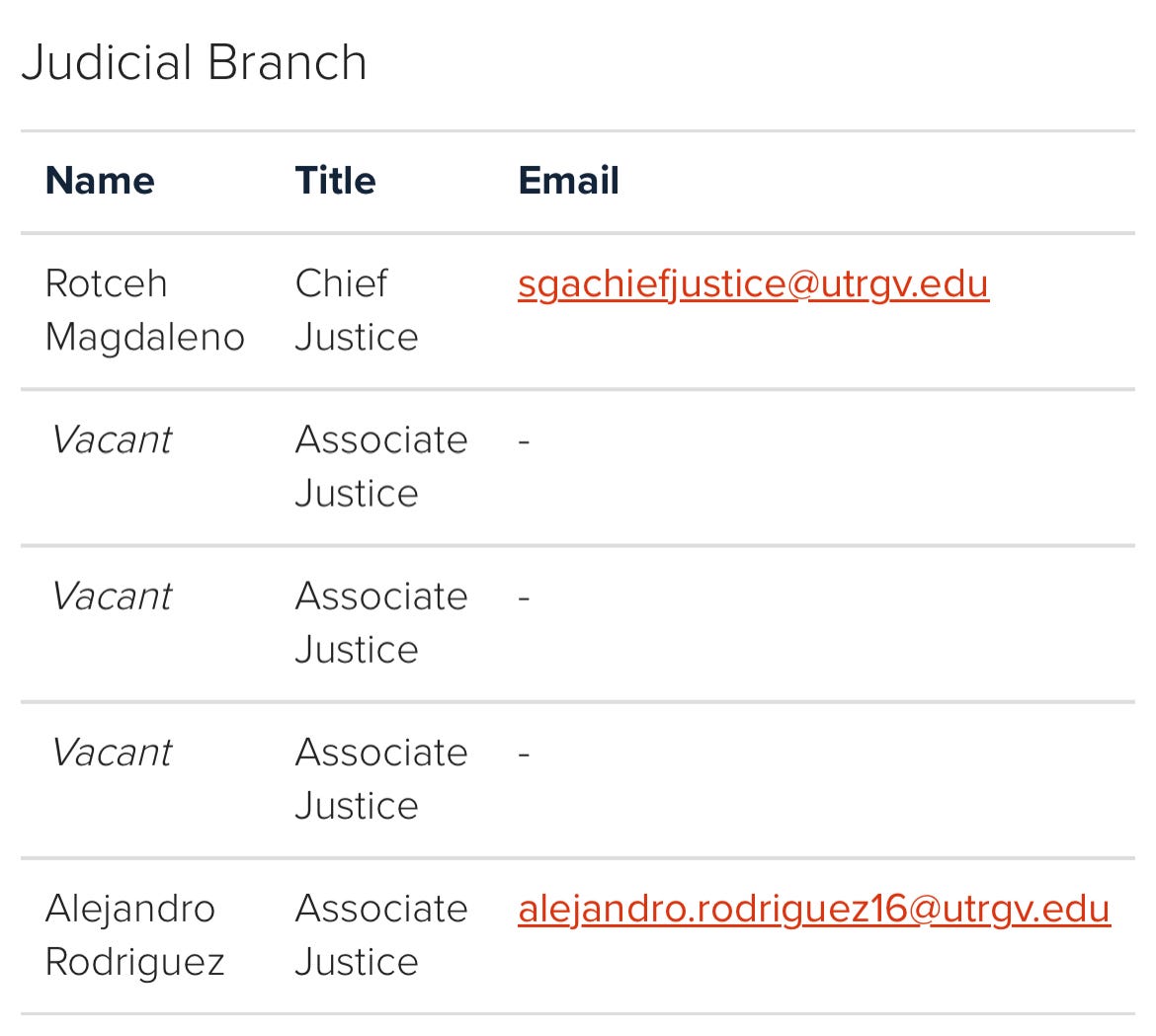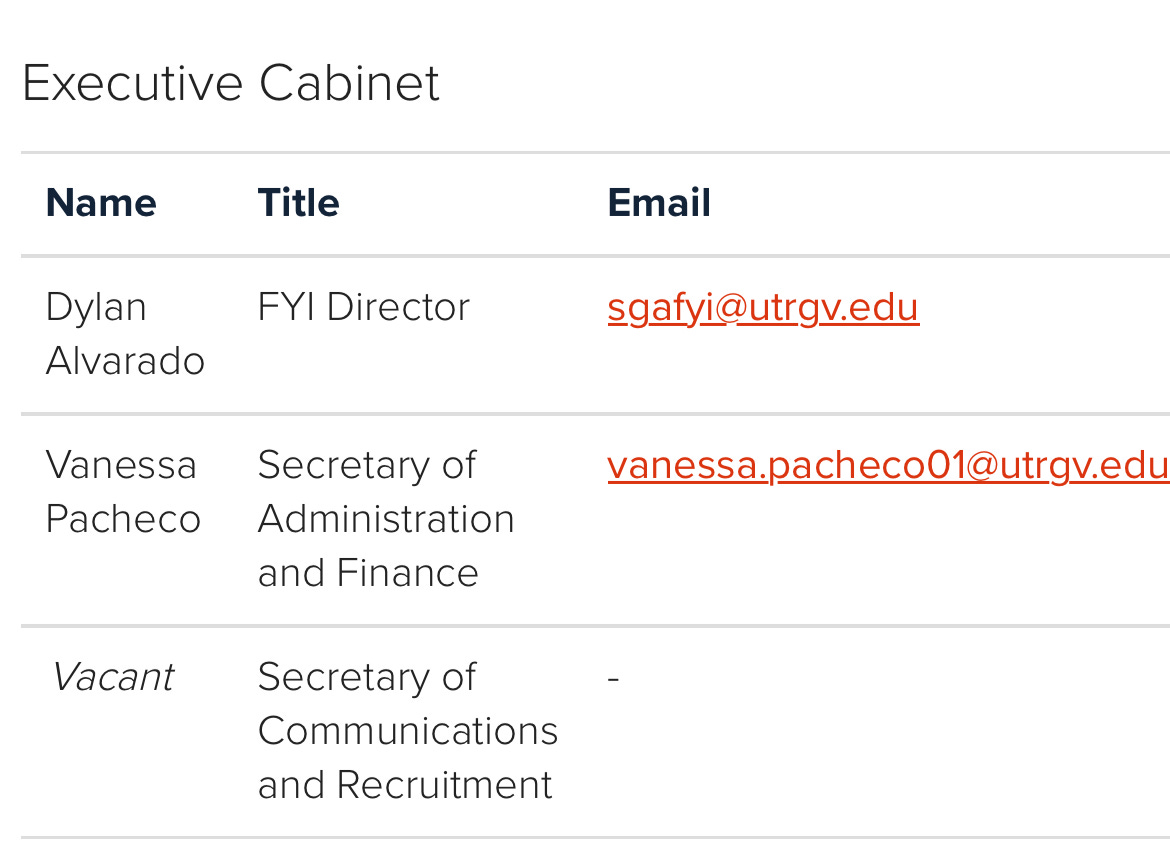UT-RGV student body demonstrates more confidence in SGA legislative branch than executive
After a sham impeachment against student senator who condemned antisemitism, and an unjust removal of a productive senator, two senators received more votes than president- and vice presidents-elect.

At the University of Texas Rio Grande Valley, elected student government association officers were sworn-in April 17, in Brownsville. The election was hotly contested, with a slate emerging called, The Vaqueros Movement.
Their goal, in opposing the incumbent president and vice president, was to fight for transparency and democratic rights within SGA, and the campus, as a change from compliance and corruption typically seen in the association.
The incumbents were re-certified, but not without help from university administrators, extensively documented in past reportage.
The incumbents, led by Odalys A. Saenz, ended up with more votes, according to figures released by the Dean of Students Office. Roughly 5% of students voted, 855 for the winning ticket.
However, 993 voted for Senator-elect, Andrea Gaytan, and 879 voted for Senator-elect, Hannah Martinez. Gaytan will be a Senator-at-large for the Edinburg campus; Martinez will be a Senator-at-large for the Brownsville campus.
Gaytan, who endorsed and passionately campaigned for the Vaqueros Movement, will be starting her second term. She was appointed during the 2023-24 term to serve as a Senator-at-Large for Edinburg.

This past term saw a politicized sham impeachment to punish speech opposed to antisemitism, to coverup the total lack of confidence there was in SGA, as well as to coverup the unjust removal of a productive senator.
Listed vacancies, to begin with, expose this vote of no-confidence by students, something which sparked the Vaqueros Movement’s emergence in the first place.
Vacancies listed on UTRGV SGA’s website are staggering. For instance, all four Senator-at-large positions for the Brownsville campus, as there are four per legacy campus — Brownsville and Edinburg, are currently vacant.
So, the Brownsville campus has had no representation in SGA, at least since December. More on this in a moment.
Next, the “judicial branch” that forwarded Uscanga’s “article of impeachment” to the “internal affairs” committee had 3 vacancies out of a total of 5 positions.
The executive position whose sole job it is to “recruit”, i.e. the ‘Secretary of Communications and Recruitment,’ is also vacant.
Although there is currently no Senator representing the Brownsville campus at-large, there was one Brownsville Senator-at-Large who served this past term, for two months, and that was Noah Trstenjak. He ran as President on the Vaqueros Movement’s executive ticket, with Uscanga, and Mikaela Johnson. The Brownsville native, appointed in October, was removed from office by December because of “absences,” one of which was the result of a bad wi-fi connection.
SGA sergeant-at-arms, Alexis Uscanga — who faced a sham impeachment, was pressured by President Saenz and SGA advisors to issue a “recommendation for removal” to Chief Justice, Rotceh Magdaleno, against Trstenjak. What they didn’t tell Uscanga, in a sinister and psychopathic withholding of facts, was that there was a pending impeachment against him, which they were fast-tracking in the background, without his knowledge.
In other words, knowing they would impeach Alexis next, they pressured him into removing his friend from office before they ultimately cut him off the chopping block as well. This, to say it plainly, is fucked up. It’s the purest distillation of evil. And only renews, strengthens and fortifies my demand that SGA “Advisors”, Kourtnie Hernandez, Delma Olivarez, and Dean of Students, Rebecca Gadson, be fired immediately, and the department abolished entirely.

Uscanga would acquiesce and submit the recommendation for removal against Trstenjak, but he also submitted a recommendation against Graduate College Senator, Maliha Alam, who had accumulated several more absences than Trstenjak and was much less involved in SGA, even though she was elected, while Trstenjak was only appointed in October. Trstenjak would be subjected to a double standard from Alam.
After Uscanga submitted his recommendations for removal against both Trstenjak and Alam, they were allowed the opportunity to submit appeals. Only Alam’s was approved. Alam would later have the gall to go on and support the sham impeachment against Uscanga, despite being the least productive and most delinquent senator in student government for the term 2023-24.
Here’s some documentation, with much more to come. Full story soon.
First, Chief Justice Magdaleno informs Maliha Alam that her appeal against removal had been approved by the “judicial branch”, which to remind you consists only of Magdaleno and one other person, leaving three vacancies unfilled.
Magdaleno and the sole associate justice was appointed by President Saenz. What would be their “quorum”? One?
Here is Uscanga’s response to Magdaleno, inquiring of the process, appealing on Trstenjak’s behalf.
He points to Alam’s much higher number of absences than Trstenjak’s, and much lower productivity in student government, despite being elected in Spring of 2023, whereas Trstenjak had only been appointed in October 2023.
Nevertheless, Trstenjak accomplished a universe more than Alam in his two months in SGA than her entire term. Alam’s only meaningful action was to support Uscanga’s sham impeachment.
Keep in mind that one of the absences struck against Trstenjak was for connectivity issues, for which he had proof:
And here is Magdaleno’s heartless response to Uscanga’s heartfelt appeal:
The 2023-24 Odalys Saenz, Ihssan Al-Qudah and Juana Jimenez administration accomplished more in point of removing productive senators, for doing their job, than they did in terms of passing meaningful legislation. That is their legacy.

Late last year, Senators Alexis Uscanga and Skyler Howell introduced bills that would mandate student government to create ‘legislative trackers’ like those made available by state and federal legislatures.
They were joined in the effort by Noah Trstenjak, who co-authored the legislation. As a former student senator myself, this was a brilliant idea. Not even my colleagues nor I thought of that, and some pretty bright minds, who are now very important people, were in those administrations.
Barely announced was news that their bill got signed by Saenz, at end of term. If you guessed that signing their bill would be one of the last things the Saenz administration would do, you’d now be proven correct.
Saenz and co. made excuses for why signing the bill was taking so long, during a candidate debate, whose delay in publishing was scandalous in itself.
They alluded to the fact that legislation needed to get out of the “internal affairs” committee before being presented to the senate.
And yet, it took only a couple of weeks for Uscanga’s impeachment to get out of that same committee.

Saenz used to chair the Internal Affairs committee, 2022-2023, when she was just a senator.
During this time, she oversaw another sham impeachment, which had less success than Uscanga’s and is far less known about, but which nevertheless served as a trial balloon for ways to frame-up people she disliked.
I’ll be discussing this covered-up impeachment in extensive documentary detail soon.
Despite students getting elected to represent the Brownsville campus within the at-large college, among them being the aforementioned Hannah Martinez, there are still quite a few vacancies within the senate, going into next term.
Out of 40 total senate positions, only 22 got filled in these past elections. Out of 10 total academic divisions, only one is completely filled, the college of engineering and computer science. Four out of those ten colleges have only one senator serving.
Both at-large colleges, Brownsville and Edinburg, have one vacancy each.
Current students and recent SGA alums I’ve interviewed have said that filling vacancies in the senate has been a bureaucratic nightmare under the Saenz regime, even going back to her days as IA chairwoman. This would make sense, given its constitutional structure.
One of the many flaws with the current SGA constitution is that it allows for the president of the association to run the senate nomination process. Thus, the responsibility for the embarrassing amount of vacancies in SGA, this past term, entirely falls at Saenz’ feet.
If anybody should have been impeached this term, it should have been Saenz.
Why is there such low confidence and interest in the student government? This was one of the questions addressed in the candidate debate. The Vaqueros Movement slate, led by Noah Trstenjak, nailed it right on the head.
They explained how student government at UT-RGV lives in a “bubble,” alienated from the rest. Saenz suggested it was the pandemic that was to blame for the lack of knowledge, as well as people taking online classes.
The other reason, which the Vaqueros Movement also accurately diagnosed for why there’s so little interest in student government, is that those few people who have had interactions with SGA were so disappointed and betrayed that they want nothing to do with it anymore.
Too many administrations, like Saenz’, filled with careerists looking to pad their resumes, have used the office of student government to suppress dissent, on behalf of administrators, in exchange for letters of recommendation and other perks. The trade-off, or (to be more precise) the bribe, to students is shoulder-rubbing with administrators.
Nationally, 5% turnout appears to be the norm, reflecting that no-confidence in student governments is a nationwide trend.1 Many complain about such turnouts, but at the first senate meeting after elections, SGA “advisor” Kourtnie Hernandez said that she thought the voter turnout was “pretty good.”
The national turnout makes sense, as most SGAs are similarly structured, and can therefore be easily rigged by unscrupulous opportunists as well.
In the current crisis regarding Israel and antisemitism, many student governments nationwide have failed the test, while those few student leaders, like Uscanga, who have stood up against hate, have been punished and persecuted.
Yet, nothing happens to racist mobs occupying campuses, until at least they’ve run amok and harassed dozens, as at Columbia University.
The passing of the legislative tracker act by Uscanga, Howell and Trstenjak is the most — excuse me, the only — consequential piece of legislation passed this entire term, the rest being ‘thank you’ resolutions honoring certain people.
The passage and forcing of Saenz to sign the bill, much to her displeasure, is a victory for the Vaqueros Movement, as the bill should carry into next term, when Senators Gaytan (who was part of the Vaqueros Movement slate) and Martinez will take their rightful seats as pillars of their respective campuses.
The movement does not plan to stop what they started with the end of elections. They are carrying their fight into the senate, this upcoming term, VM spokespeople said.
Happy International Workers Day!
jonathansalinas@substack.com
Also taking a look at UT-Austin’s student government association’s latest elections, their voter turnout numbers were even lower, with only a few hundred or less voting for individual senate positions. Students largely don’t care about SGA anywhere in the country. A search for SGA election articles will yield nationwide articles also showing that only 5% of student body tends to vote.
















